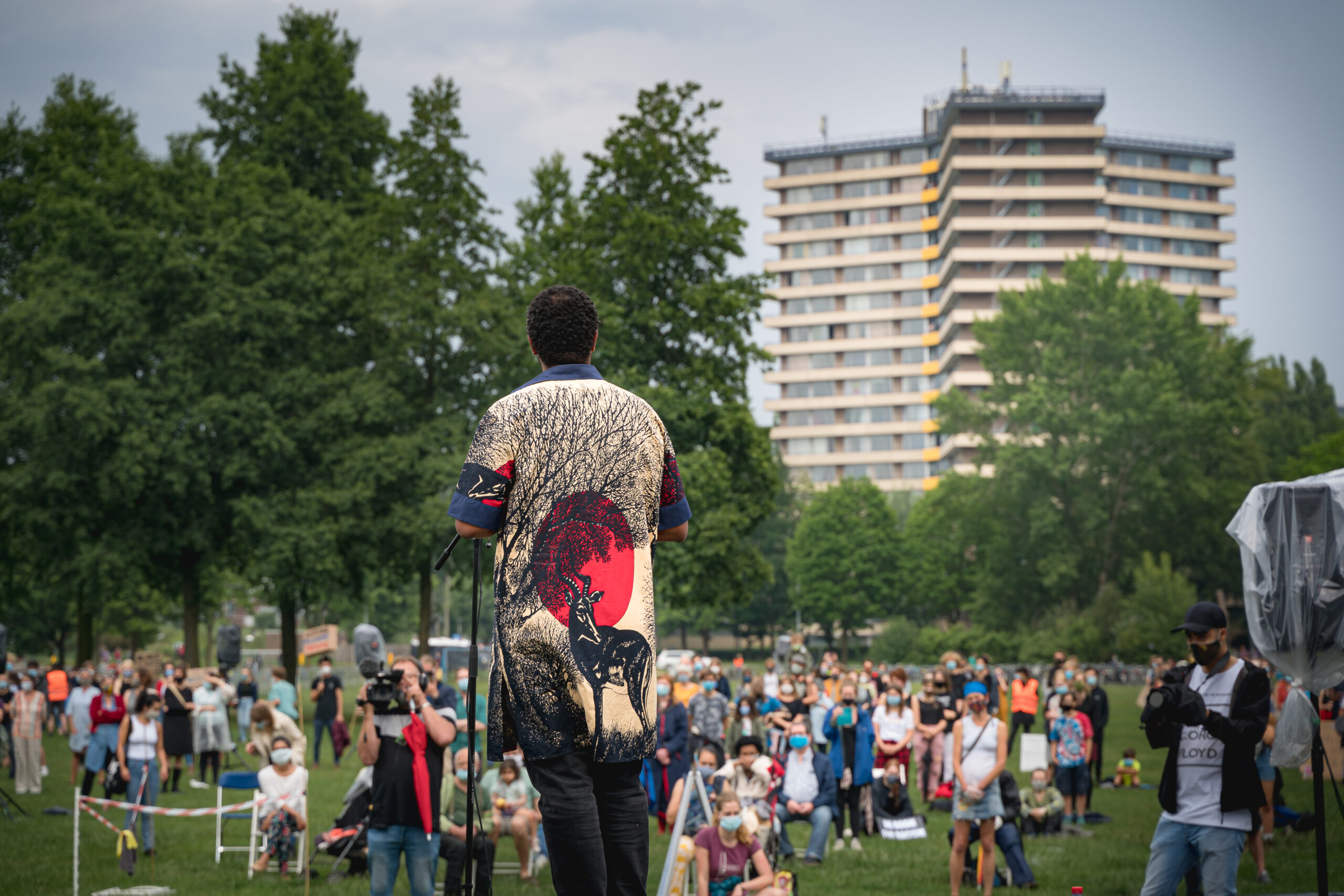Worldwide BlackLivesMatter (#BLM) demonstrations, a petition calling for an investigation into discrimination in Wageningen, and the founding of the Anti-Racist Association ARA Wageningen. The antiracism movement moved into top gear last summer. Where has it got us? ‘A lot has been happening behind the scenes, but WUR moves slowly.’
Let’s go back to June 2020. ARA members Jerry Gumbs (a student of Environmental Sciences) and Percy Cicilia Jr (an artist, activist and city-maker in Wageningen) launched a petition calling for an investigation into discrimination, which was signed by large numbers of people. A discussion followed with the WUR Executive Board, and later in June ARA-WUR was established: a group of students, WUR staff and local and international Wageningen residents who wanted to tackle racism, discrimination and unequal treatment together. The ‘WUR’ in the name was recently replaced by ‘Wageningen’. ‘The university is not the only place where racism is present,’ says Jerry. ‘We are talking about institutional racism, and that means taking a larger view and looking at the whole of Wageningen. This is not just about individual cases of discrimination, but also about communication, diversity among staff, the housing market, and bias in education and research.’
The next step was to develop a vision, working with WUR’s diversity and inclusion policymakers, staff at Human Resources who draw up HR policy, and also people like education director Arnold Bregt. Cicilia Jr: ‘Since then, people haven’t heard from us very much, but behind the scenes we certainly haven’t been sitting still.
They always say, less talk and more action. We’ve nearly finished the talking part now
We have held weekly discussions with everyone involved for about four months. We tabled a draft proposal for a three-year plan (see inset) in January. Now we are waiting for the Board’s response.’
It was a lot of work and it wasn’t always easy. ‘Sometimes things seem to move really slowly. It is very time-consuming, and we are all doing this alongside our studies or jobs,’ says Gumbs. ‘Activism calls for stamina, I know that. Both the problems and the changes are often hard to see or to measure. What is more, it comes close to me personally, which makes it emotionally taxing. If I talk about racism, people often say, give us an example then. That is not taking the problem seriously. There isn’t just one example; it’s something that a lot of people experience all the time, day in day out.’
Nevertheless, Cicilia Jr does think there are signs of change. ‘Last week the Wageningen police put out a description of a missing girl as an ‘unkempt Eastern bloc type’. That drew a flurry of angry reactions on social media and quite rightly got into the newspaper. The fact that it didn’t go unnoticed is a sign that more people are aware of racism.’
Dinosaur
Gumbs: ‘I realize that the university is a cumbersome organization. It’s a bit of a dinosaur, very large, heavy and old. It makes sense that change takes time. And when I hear from activists from other cities how it’s going there, I think we’ve achieved quite a lot.’
‘At least we’ve got some solid ideas on paper now,’ adds Cicilia Jr. ‘They always say, let’s have less talk and more action. We’ve nearly finished the talking part of things, and now we need to decide who is going to take action and where. Who will be doing the implementation, how are we going to supervise it, and how are we going to monitor and evaluate it?’
There is no need to reinvent the wheel, though. Cicilia Jr: ‘There is a lot of existing knowledge in Wageningen. Among student parties, for instance, who often receive reports. They know what’s going on. And there are enough people working at WUR who know about diversity and inclusivity. We are a horizontal organization and we like to collaborate and motivate people, not to take over other people’s work. We are actively recruiting new members, and anyone who would like to help is welcome – do get in touch with us.’
ARA Wageningen wants to tackle racism and discrimination at the university under four headings:
1 A helpdesk
We need a clearly visible helpdesk for discrimination and unacceptable behaviour, where you get additional help (psychological support, for instance, and the forwarding of your complaint to people who can work on solutions).
2 Staffing policy
How can we prevent – possibly unconscious – discrimination in recruitment and career development procedures? Look into admission procedures and exclusive language use.
3 Institutional racism in education and research
How do education and research maintain stereotypes, and how can they combat them? Do courses look beyond Europe or North America? How much diversity is there on discussion panels? Where does the literature that is used come from?
4 Awareness-raising
You can only work on a problem when you are aware of it. We need lectures and training courses on racism and discrimination, and safe spaces for sharing experiences and listening to others.

 The #BLM-protest in Wageningen on 14 June 2020. Photo Sven Menschel
The #BLM-protest in Wageningen on 14 June 2020. Photo Sven Menschel